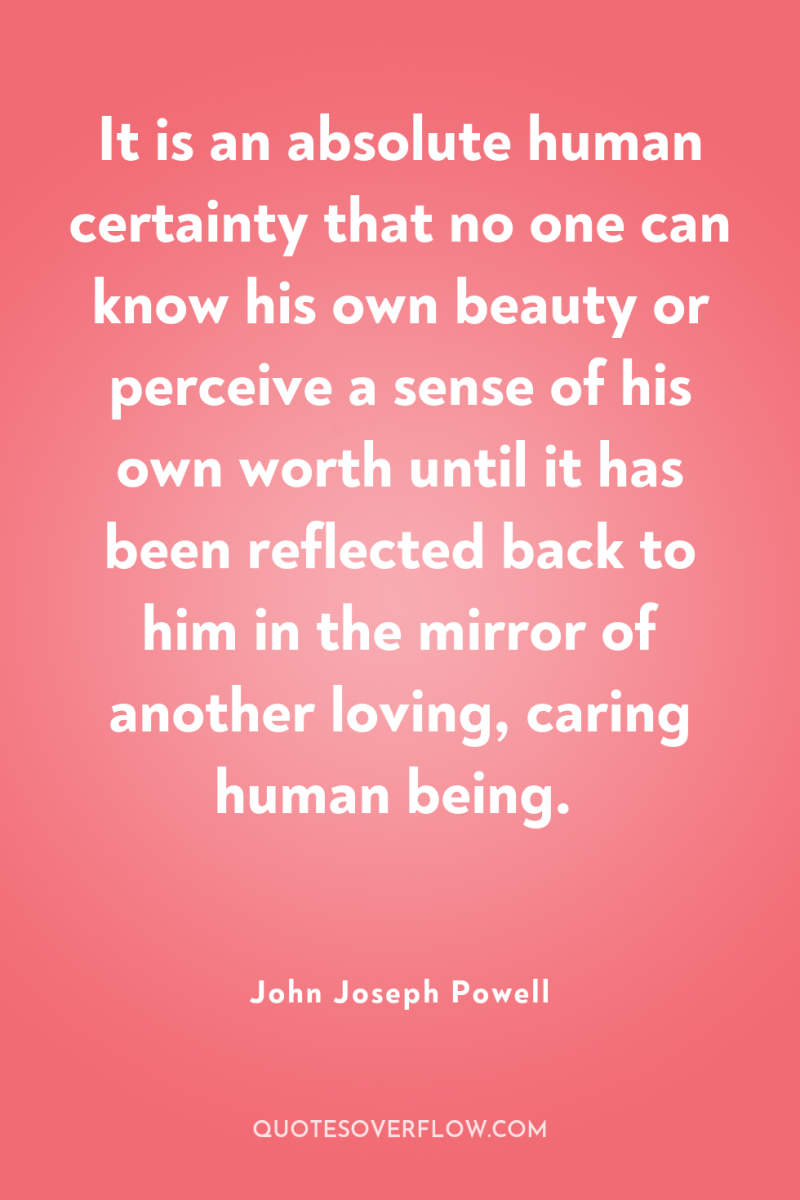
1
It is an absolute human certainty that no one can know his own beauty or perceive a sense of his own worth until it has been reflected back to him in the mirror of another loving, caring human being.John Joseph Powell
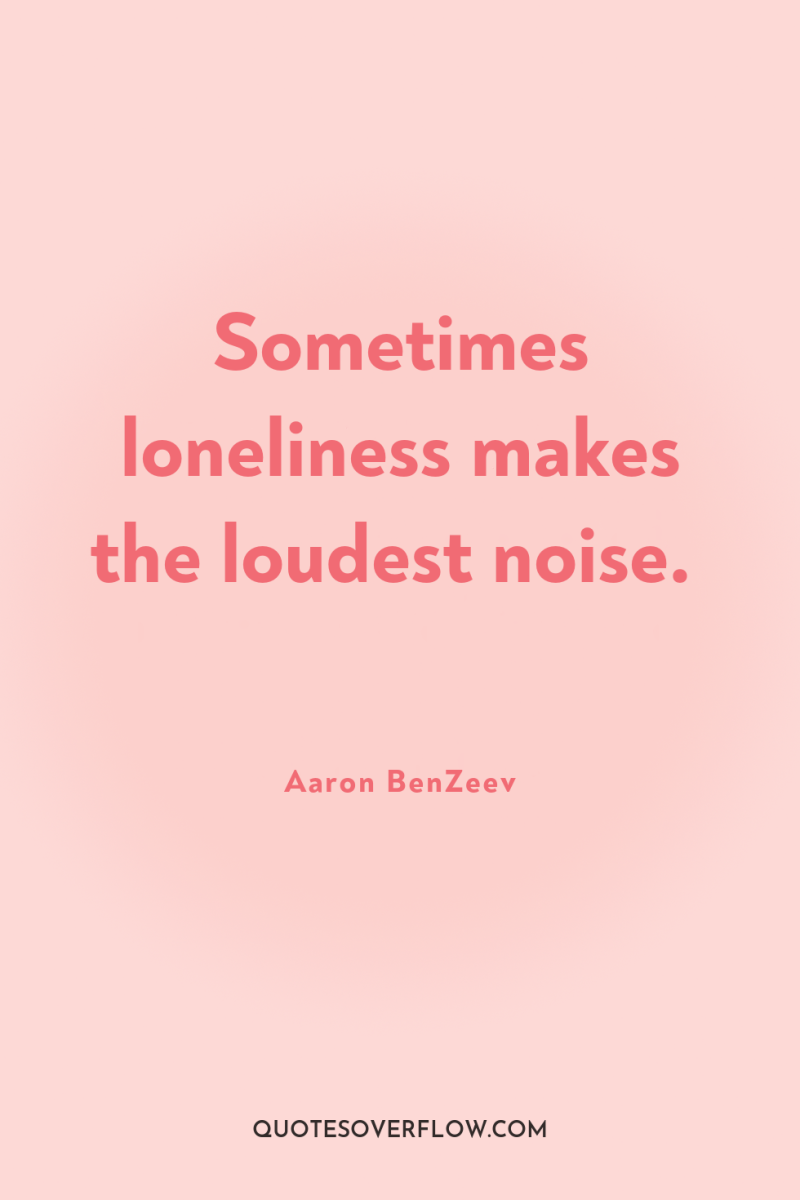
2
Sometimes loneliness makes the loudest noise.Aaron BenZeev
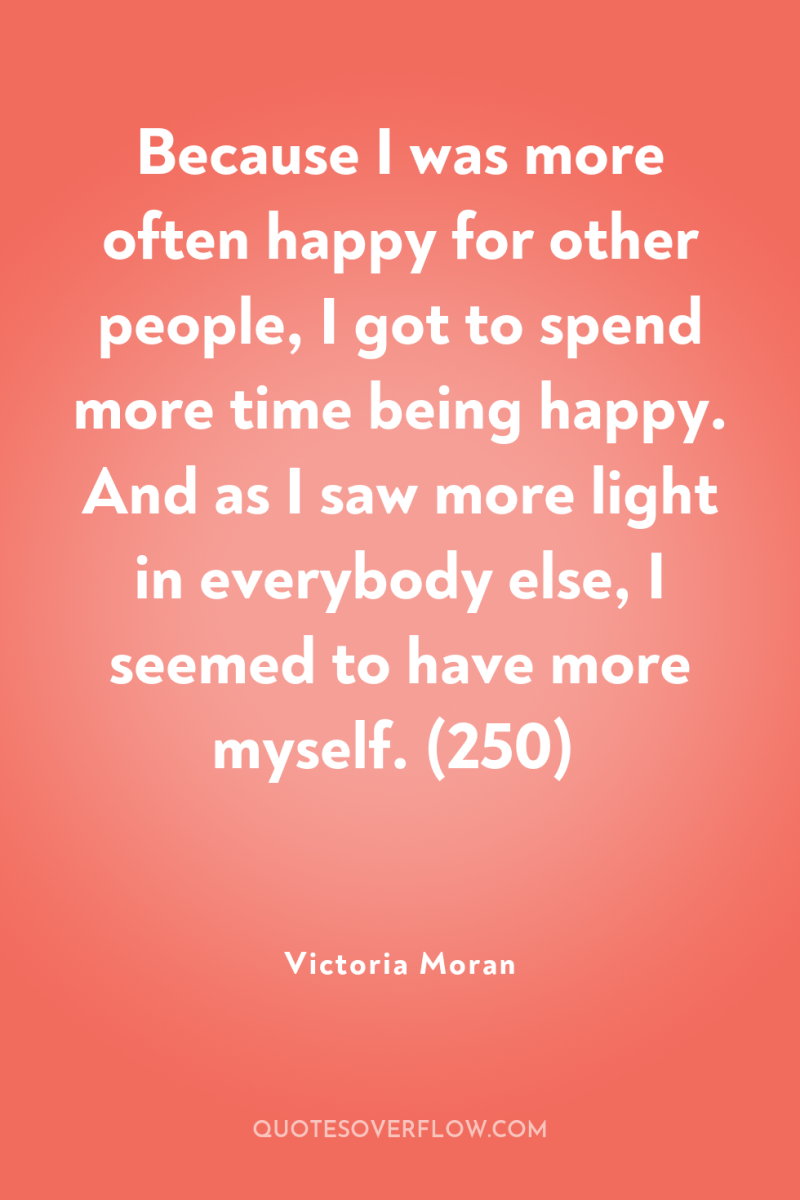
3
Because I was more often happy for other people, I got to spend more time being happy. And as I saw more light in everybody else, I seemed to have more myself. (250)Victoria Moran
4
On No Work of WordsOn no work of words now for three lean months in the bloody Belly of the rich year and the big purse of my body I bitterly take to task my poverty and craft: To take to give is all, return what is hungrily given Puffing the pounds of manna up through the dew to heaven, The lovely gift of the gab bangs back on a blind shaft. To lift to leave from the treasures of man is pleasing death That will rake at last all currencies of the marked breath And count the taken, forsaken mysteries in a bad dark. To surrender now is to pay the expensive ogre twice. Ancient woods of my blood, dash down to the nut of the seas If I take to burn or return this world which is each man's work. .Dylan Thomas
5
Friendship- my definition- is built on two things. Respect and trust. Both elements have to be there. And it has to be mutual. You can have respect for someone, but if you don't have trust, the friendship will crumble.Stieg Larsson
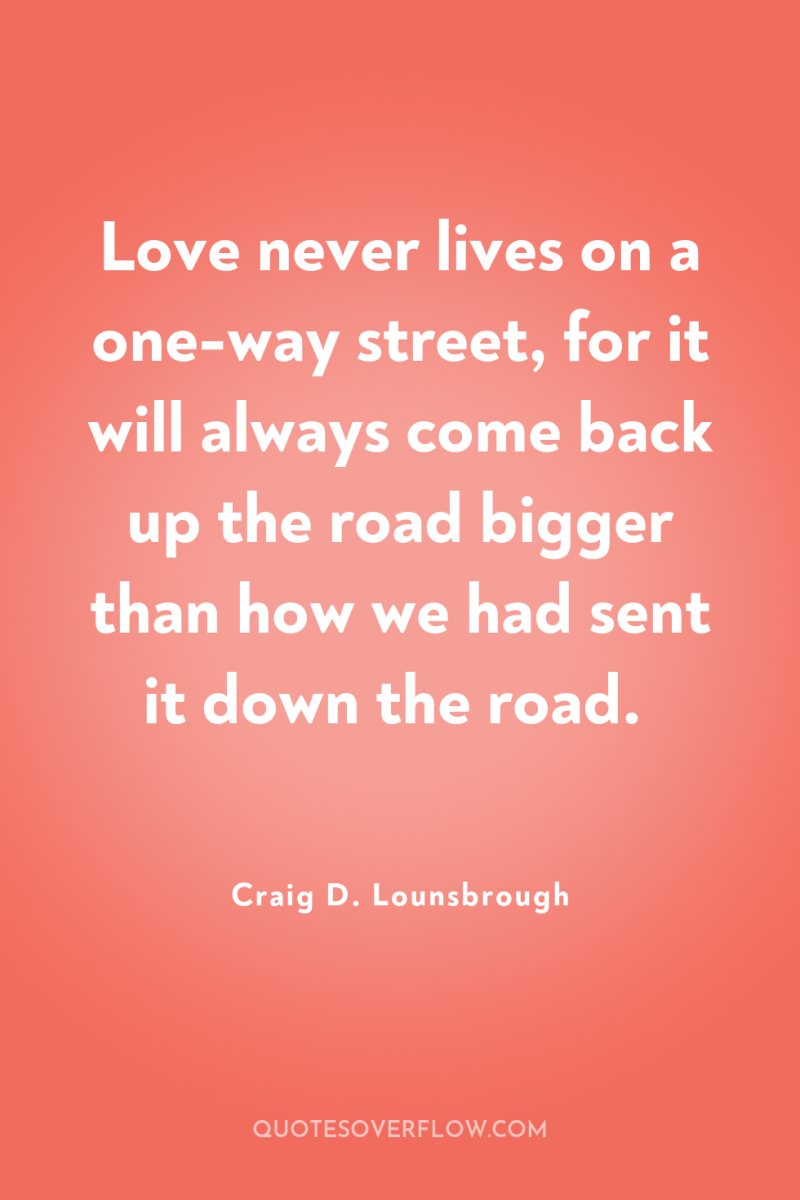
6
Love never lives on a one-way street, for it will always come back up the road bigger than how we had sent it down the road.Craig D. Lounsbrough
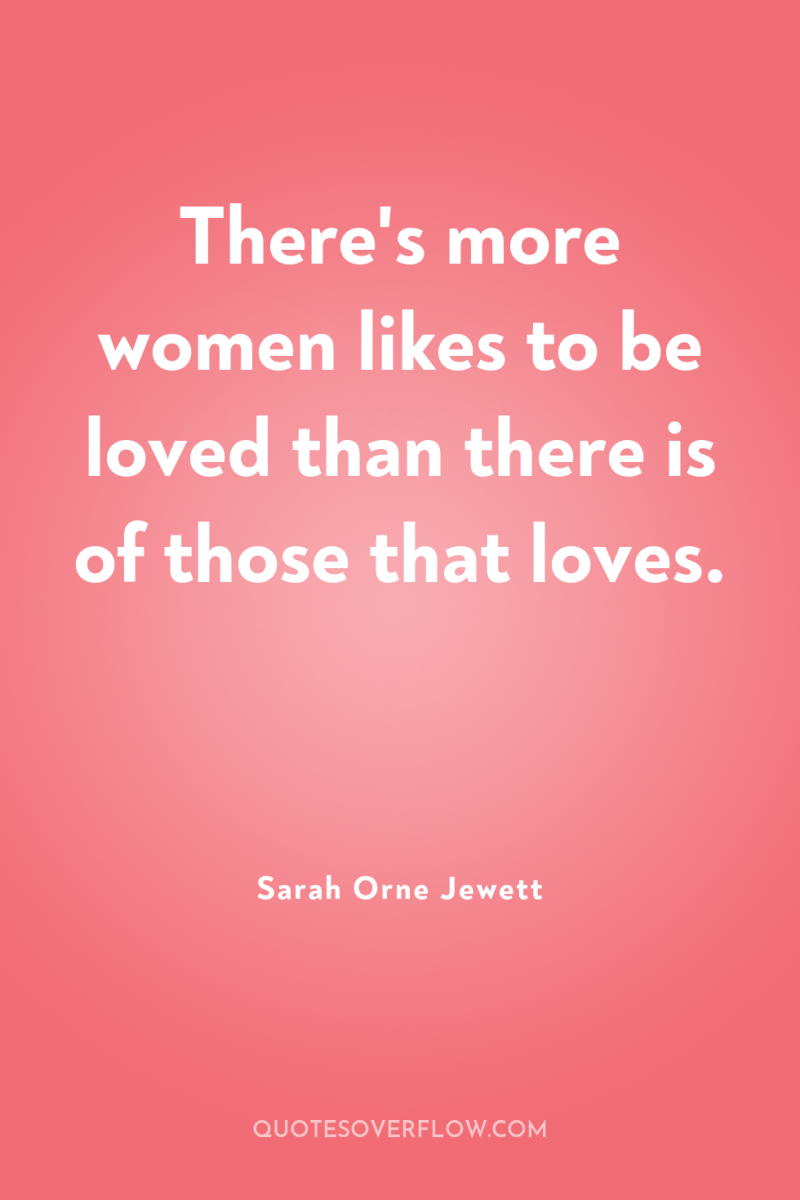
7
There's more women likes to be loved than there is of those that loves.Sarah Orne Jewett
8
THE UNFORGIVENTell me if you've ever had to deal with these kinds of people: The kind who take and don't give. The kind to whom you give and give, And they keep asking. The kind to whom you give and give and they say you gave nothing. The kind whom have never offered anything, But act like they're the ones providing E V E R Y T H I N G. The kind you give and give, But take more than you can give. And when they have already taken everything, They get mad at you when you say you have Nothing more to give. The unforgiving, The misgiving, Wastefully living -And selfishly driven. The rat that never gives back, Yet is so quick to attack -Because they think the word T A K I N G Seriously means G I V I N G.Suzy Kassem
9
Focussing on Karma than on the lessons needed to be learned is setting a trap for "what goes around comes around." Never wish for others what you will not wish for yourself. Do to others as you want done to you. That's what love is about!Kemi Sogunle
10
Real sex is as much about reciprocity as it is exploration and if you need a reason to resent a man later on, just consider the guy who doesn’t believe in cunnilingus...Roberto Hogue
11
To be a best friend, the best word to live by is reciprocity.Debasish Mridha
12
People relate giving to reciprocity. They expect things to be expressed in a way they can understand, which is usually their own.Aleksandra Ninkovic
13
What the devil is 'wordsharing'? Does the word for 'speak' mean 'listen' just as well? If I said, 'Listen to me! ' you might talk, instead."" What use is the one without the other? It took me a long time to see this distinction in Valan speech." Spinel thought over the list of 'share forms': learnsharing, worksharing, lovesharing. "Do you say 'hitsharing, ' too? If I hit a rock with a chisel, does the rock hit me?"" I would think so. Don't you feel it in your arm?" He frowned and sought a better example; it was so obvious, it was impossible to explain. "I've got it: if Beryl bears a child, does the child bear Beryl? That's ridiculous."" A mother is born when her child comes."" Or if I swim in the sea, does the sea swim in me?"" Does it not?" Helplessly he thought, She can't be that crazy. "Please, you do know the difference, don't you?"" Of course. What does it matter? .Joan Slonczewski
14
Perhaps the most legitimately dispiriting thing about reciprocal altruism is that it is a misnomer. Whereas with kin selection the "goal" of our genes is to actually help another organism, with reciprocal altruism the goal is that the organism be left under the impression that we've helped; the impression alone is enough to bring the reciprocation.Robert Wright
15
Our actions are like ships which we may watch set out to sea, and not know when or with what cargo they will return to port.Iris Murdoch
16
The rule of the people has the fairest name of all, equality (isonomia), and does none of the things that a monarch does. The lot determines offices, power is held accountable, and deliberation is conducted in public.Herodotus
17
It's not equality that counts, it's reprocity that counts. Love is not like a balance sheet. There's no such thing as double-entry accounting when it comes to love.Debra Ollivier
18
Being culturally aware and respectful of others’ cultures will help you to keep the habit of making eye contact in context. As a matter of fact, in some parts of the world making eye contact can be construed as being exactly the opposite of what I am sharing in these pages. Making a great first impression is always about the specific environment and circumstance, isn’t it?Susan C. Young
19
As we explore this valuable non-verbal language, please note that these principles do not apply in many cultures around the world. In some cultures, direct eye contact may offend, affront, violate, or threaten.Susan C. Young
20
We've all been in the middle of a conversation and the person with whom we are speaking breaks eye contact, appears distracted, glazes over, or looks elsewhere. Their simple eye movement can quickly break down communications by making us feel ignored, dismissed, or rejected. For some, it may be accidental and unintentional, while for others, avoiding eye contact is on purpose.Susan C. Young
21
12 Reasons Why People Avoid Eye Contact1. They do not want to reveal their feelings.2. They are not being honest and truthful.3. It makes them feel vulnerable and exposed.4. They are being rude or indifferent.5. They are ashamed or embarrassed to talk about something.6. They are nervous or lacking confidence.7. It makes them feel very uncomfortable.8. They are arrogant, snobby, and pretentious.9. They are afraid of saying the wrong thing or looking stupid.10. They are shy or introverted.11. They are accessing internal thoughts or emotions to process and contemplate information.12. Or as mentioned before, and important to remember, it may simply be a cultural value or behavior.Susan C. Young
22
There are times when eye contact can move to the dark side and become creepy, hostile, rude, or condescending. When it is overused or made for the wrong reasons, eye contact can make others feel uncomfortable and leave a terrible impression. - obsessive staring- mocking- too much intensity - inappropriate focus- averting eyes- obvious contempt - gawking, ogling - casting the "evil eye"- over-watching- intimidating- unwelcome looks- rolling the eyes.Susan C. Young
23
As with most things in life, a healthy balance will keep us on the right path. To avoid too much eye contact or too little, seek to create a comfortable mix. It is generally encouraged to use more eye contact when you are listening and less when you are speaking.Susan C. Young
24
When speakers make eye contact with an audience, they will be perceived as being more prepared, more competent, confident, and trustworthy. Eye contact helps to relax the speaker and reminds them that their audience is made up of separate individuals who perceive things differently. Audience response is clearly seen in the expressions of their eyes.Susan C. Young
25
7 Ways to Improve Eye Contact at any Time1. Relax into the moment by smiling.2. Practice making eye contact with people you trust, so that when you are with strangers, it is easier to form a connection.3. When you feel uncomfortable, begin by looking at their mouth or forehead.4. Lean in and show that you are interested and attentive.5. Put a little space between you and the other person.6. Remember that the other person may be feeling just as awkward.7. Don’t give them a blank stare throughout a conversation. Rather, practice gazing down or to the side every few moments so that you appear relaxed.Susan C. Young
26
Mirroring is a powerful neuro-linguistic programming technique that can be used to bond with others, build rapport, and reach mutual understanding more quickly. You may already be using it instinctively without even being aware.Susan C. Young
27
Mirroring is simply the process of discreetly matching and mirroring the subtle behaviors and qualities of the person with whom you are connecting. It's a form of behavioral reflection that unconsciously reveals, "We're more alike than we are different.Susan C. Young
28
Mirroring is especially helpful when our differences may divide. Think of the times when you have made a diligent effort to speak in another person’s native language to communicate and connect with comfort. By doing this, you are extending a considerate courtesy to meet them where they are, thus removing barriers and improving engagement.Susan C. Young
29
Coordinating your gestures with someone’s subtle behaviors, can help you gain understanding, realize comfortable compatibility, and develop mutual trust.Susan C. Young
30
Why Does Mirroring Work? Scientific research suggests ‘mirroring’ techniques works because of the mirror-neurons which are fired in our brains when we both perceive and take action. When we observe someone doing something, we may feel as if we are having the same experience.Susan C. Young
31
When you see someone smile, does it naturally make you want to smile back? When you are irritable, do you find that people mirror your irritability? When someone yawns around you, do automatically do the same? When you hear someone celebrating, do you feel inclined to join in and celebrate too? Your responses are not forced, but instinctual and empathetic.Susan C. Young
32
Mirroring provides social cues through body language and behavior which enable us to develop more empathy and understanding for others.Susan C. Young
33
Who are we the most comfortable with? People who are the most like us! The “Similarity-Attraction Hypothesis” (Newcomb, 1956) found that similar (real or perceived) personalities are a major determinant of our likability and friendship choices. It is simply human to gravitate toward people like us. This tribal inclination runs the gamut across demographics of age, ethnicity, culture, education, religion, and even personality style. Mirroring will enable you to find ways to create the comfort of familiarity through similarity. .Susan C. Young
34
Since we know people like to do business with people who are most like themselves, consider this: Excellent sales people understand that "matching and mirroring" another person’s body language is a powerful technique and subliminal way to develop trust, build rapport, and make their clients more comfortable and engaging. Subtly mirroring the postures, gestures, and body language of your client inspires a kinship of commonality.Susan C. Young
35
Early in my sales career, various sales trainers taught our teams how to use matching and mirroring to build rapport and earn trust with our clients. When done well, it would inevitably help us improve customer service and closing ratios. It was not encouraged as a deceptive sales practice to manipulate, but rather a subtle way to make a great first impression and connect on a meaningful level.Susan C. Young
36
By mirroring, speaking, and moving in tandem with my clients, I provided them with a sense of familiar comfort and ease which helped us work well together. When they leaned forward, I would lean forward. When they crossed their arms, I would cross my arms. When they began speaking slowly and quietly, I would do the same. These subtle actions help to us to communicate more effectively.Susan C. Young
37
Becoming aware of what you are doing and how others perceive you will provide you with instant insight for making changes where necessary.Susan C. Young
38
Whatever you are putting out into the universe is going to be returned unto you and have a direct correlation to what you are getting back. In many ways, you are a magnet and manifest accordingly.Susan C. Young
39
Think of your personal and professional life–are you attracting what you want? Are you attracting the kind of people you like? Do you feel that life is working for you or against you? How have others been treating you? Are you pleased with your results?Susan C. Young
40
You can shift other people's attitudes by shifting your own. When people project rudeness, impatience, and intolerance they attract the same in return. If someone looks like they are having a difficult day, you can shift their world by simply sharing a kind word.Susan C. Young
41
Modeling for others a sincerely positive and encouraging countenance will not only enrich their lives, it can foster trust and appreciation for you. This subtle technique of mirroring can help others feel compatibility with you and lead them to feel better about themselves. A win for everybody!Susan C. Young
42
5 Tips for Mirroring Others1. Body language. When they smile, you smile. When they lean back in their chair, you lean back in your chair. When they cross their legs or fold their arms, you do the same.2. Vocabulary or specific words. Notice their language and the words they choose and use–their keywords, expressions, expletives, or phrases. 3. Communication style. People receive, process, and deliver information in different ways. Notice whether someone is results driven or relaxed, emotional or pragmatic, talkative or observant. Recognizing their style will enable you to adapt your style to theirs to build rapport and improve communication.4. Vocal style. a. Speech rate– If they are talking fast, you talk fast. If they are talking slowly, you talk slowly. Consider rhythm, pace, and tempo. b. Volume– If they are speaking quietly and softly, match their volume. c. Tone– Mirror their emotion, tone, and pitch. You can even seek to mirror their grammar and dialect, as long as it is discreet and respectful.Susan C. Young
43
Mirroring and matching works at the sub-conscious level and serves to make the other person feel more “comfortable” and connected to you. These subliminal actions can create a subconscious feeling of unison and connection that demonstrate how much you have in common.Susan C. Young
44
Your eyes are the windows to your soul” indeed. It is a cliché for a good reason–it is a timeless truth with universal application.Susan C. Young
45
Your direct eye contact is one of the best compliments you can give another human being. You are subliminally telling them that you are listening, they matter, and that what they have to say is important.Susan C. Young
46
Meaningful eye contact has the power to transcend time and space to connect us with others and can be one of the most gracious and important ways to demonstrate attention and respect.Susan C. Young
47
When you make eye contact with another person, you can send thousands of silent messages without even speaking a word. No wonder eye contact can be both a direct form of communication and an elusive attribute at the same time.Susan C. Young
48
One simple glance can convey to your recipient that you are .- Present- Interested- Paying attention- Being respectful- Listening- Confident- Engaged- Caring- Dedicated- Appreciative- Empathetic- Focused- Supportive- Trustworthy- Acknowledging- Excited This list barely scratches the surface; however, it opens the conversation about how vital your eye contact is for making positive first impressions.Susan C. Young
49
Whether it is in a sales situation, love at first sight, a husband and wife having an important conversation, a parent disciplining a child, or a teacher instructing her students, eye contact is a powerful body language for enriching engagement, focus, and communication.Susan C. Young
50
Reciprocal marketing, promotions and links. In public good experiments, behavioral economists have demonstrated that the potential for reciprocal actions by players increases the rate of contribution to the public good, providing evidence for the importance of reciprocity in social situations.Carl William Brown
51
How generously they shower us with food, literally giving themselves so that we can live. But in the giving their lives are also ensured. Our taking returns benefit to them in the circle of life making life, the chain of reciprocity. Living by the precepts of the Honorable Harvest–to take only what is given, to use it well, to be grateful for the gift, and to reciprocate the giftRobin Wall Kimmerer